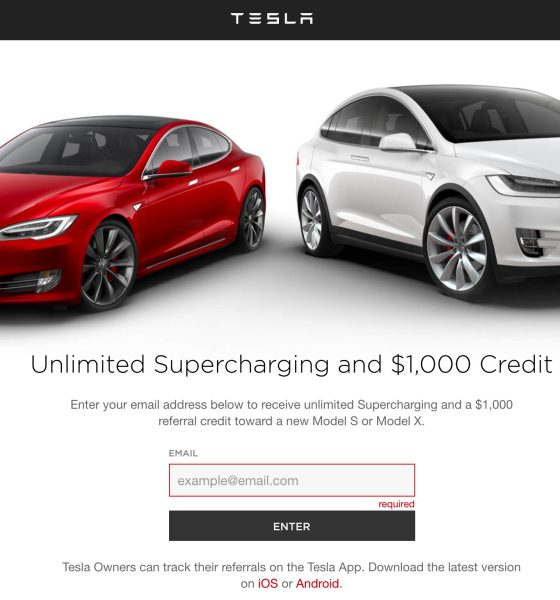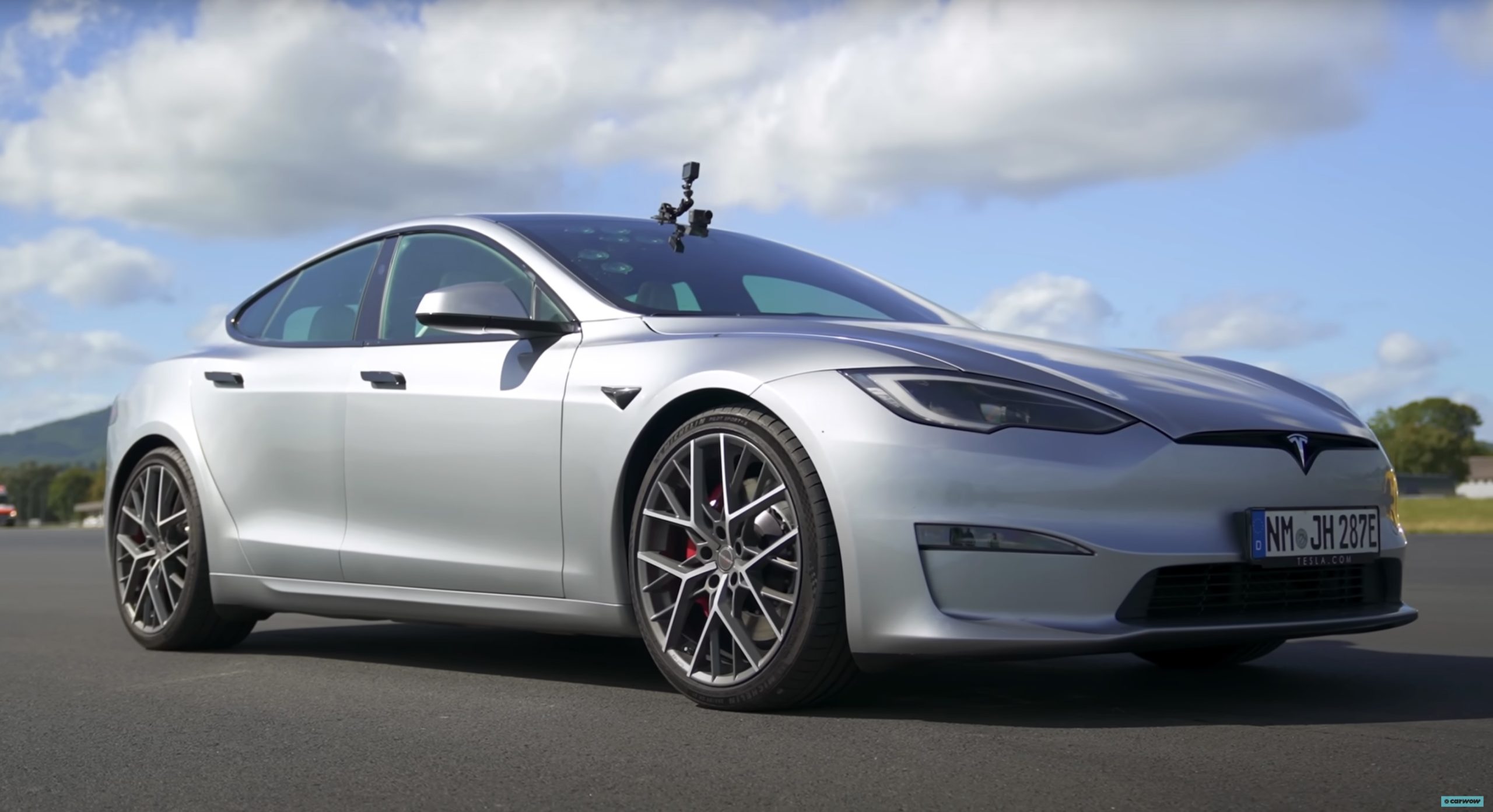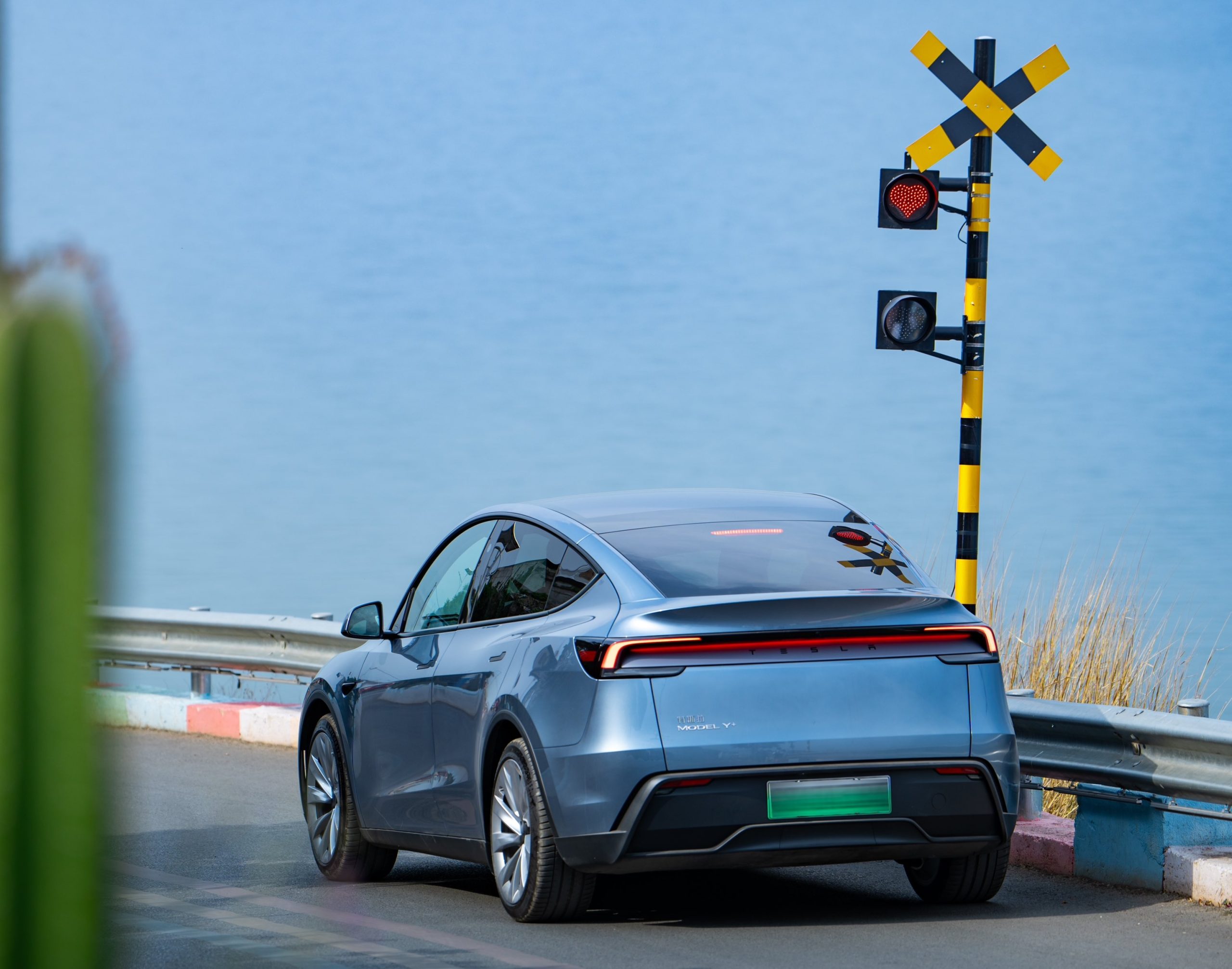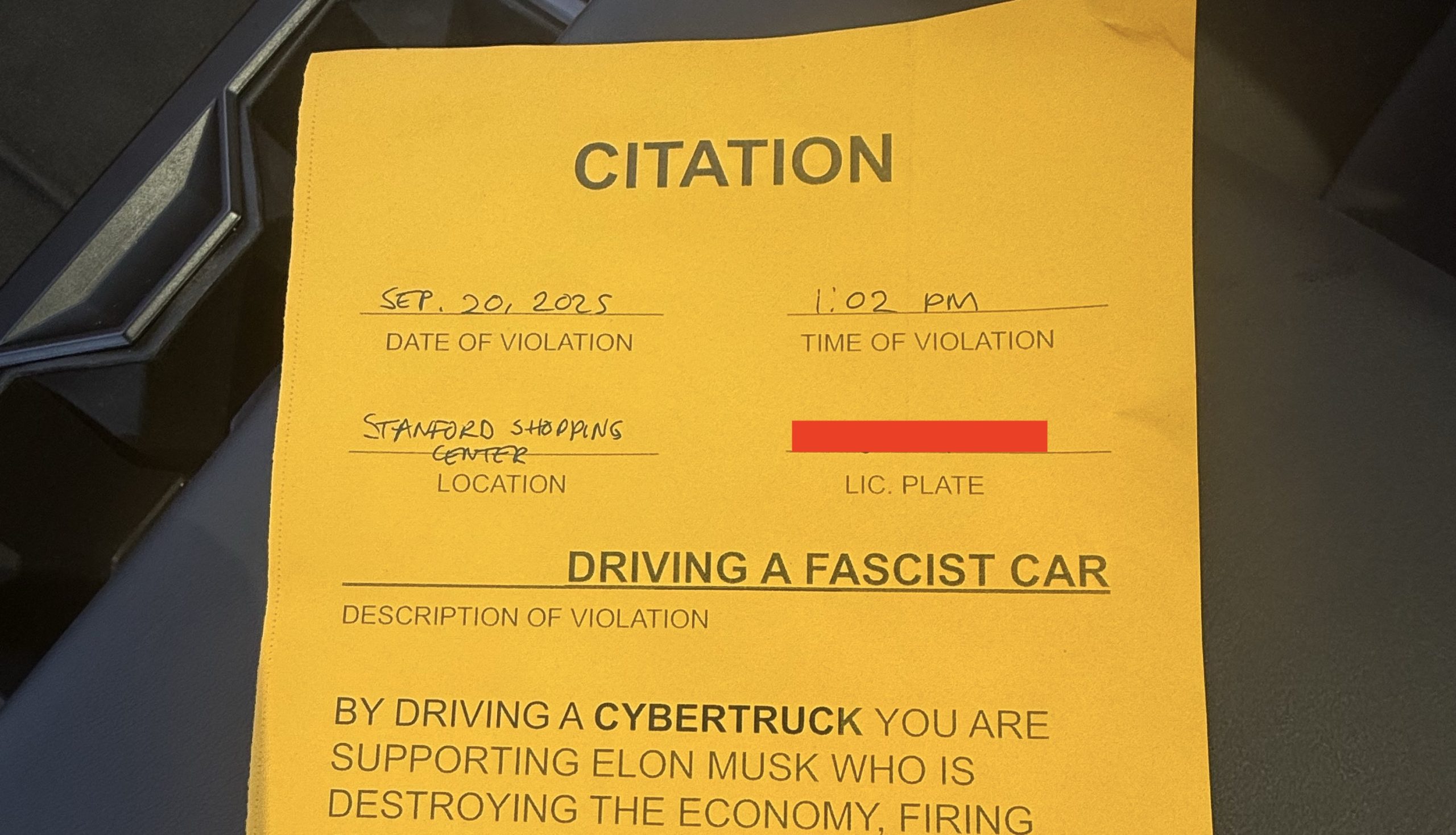

Lifestyle
Tesla Referral Program crackdown: Musk to “shut down” referral code abuse
Elon Musk’s highly successful and once “experimental” Tesla Referral Program has arguably been one of the company’s best viral campaigns for selling cars. The concept is simple. Buy a new Tesla, refer a friend to buy one through a referral code, and win exclusive prizes including a highly coveted invite to a Tesla unveiling event. Whether it’s a VIP Fremont Factory tour, an invite to the upcoming Model 3 launch party, or the opportunity to witness Elon Musk unveil Tesla’s electric Semi truck on September 28, chances are you want to be there and you’ll do anything to make it happen. And that’s exactly what many have done.
In question are the ethics behind the oversharing of one’s Tesla referral code. It’s a normal occurrence these days to see Tesla owners shamelessly plug their personal referral codes across social media, on forums and even on email signatures. I’m guilty of it and I’m sure many others are too. But when Tesla owners begin buying keyword-based Google ads to promote their referral code on a massive scale, a question of whether this is fair or even “legal” under Tesla’s Referral Program “Good Faith” clause naturally arises.
According to Tesla:
Good Faith
We introduce programs such as these in good faith and expect the same good faith in return. Please note that we may withhold awards where we believe customers are acting in bad faith or otherwise acting contrary to the intent of this program. To be clear, commercializing or otherwise selling referral codes is not appropriate, and we will not honor such codes. We cannot cover every nefarious scenario, nor will we attempt to, but we do promise to be fair and reasonable.
One can interpret “Commercializing or otherwise selling referral codes” as paying a person or service to use one’s referral code, which would put Google AdWords buyers in violation of Tesla’s Good Faith clause. But what if you’re a highly popular Model S or Model X-owning YouTuber that has the ability to influence millions of fans on the purchase of a Tesla? Is it moral to ask your subscribers to consider using your referral code?
Not according to Twitter user Station2Station. In a tweet to Elon Musk, Station2Station writes, “As an owner, please DO AWAY with referral code prgr. Too many youtube owners hustling their YT channels to gain refs.”
Musk replied back, stating that he “will shut that down”, which presumably means he’ll disqualify any referral code use that came by way of someone that is not a “friend” to the original Tesla owner.
Will shut that down. The point is to provide something special that only existing owners can give to friends and it is limited to 5 people.
— Elon Musk (@elonmusk) May 24, 2017
While Musk’s intention is clear that the program is meant to be something special, penalizing Tesla-owning YouTubers for sharing their referral codes would be a step in the wrong direction. Let us not forget that many Tesla-owning YouTubers began their channels with the sole purpose of sharing their love for the company, their cars, and most importantly Musk’s vision of the future. As their voice amplified across the Google-owned social video platform and subscriber counts grew, so did Tesla’s brand reach and presumably the number of Model S and Model X vehicles sold each quarter. Should they be faulted for having a loyal following, many of whom built something special in the form of friendships with their YouTuber through social media? I say no.
In this instance, it’s less of an issue of referral code misuse and more the case of sour grapes.
Here’s a fun blast from the past email sent by Musk when the first Tesla Referral Program was introduced.
From: “Elon Musk” <elon@teslamotors.com>
Subject: Trying something new (plus party at the Gigafactory and a Founder Series Model X)
Date: July 29, 2015 at 2:05:31 PM PDT
Word of mouth has always been a major part of how Tesla sales have grown. When I meet Tesla owners, one of the first things they often tell me is how they have convinced many others to buy the car. As you may already know, Tesla does not advertise or pay for endorsements or product placement. Maybe by doing so we could sell more cars, but I don’t like the idea of trying to trick people into buying a product by false association. If you see somebody famous driving a Model S, it is because they genuinely like the car.
If you see it in a movie or TV show, it is because the people associated with that production genuinely like the car. Besides word of mouth, another way that our cars are sold is through stores. These will always be important to allow people to check out new models and ask our product specialists detailed questions. However, stores are quite expensive to set up and operate. In reviewing the Tesla cost of sales, we found that it is approximately $2,000 to sell a car through our stores, higher in some regions and lower in others.
Both ways of reaching potential customers are important, but, if we can amplify word of mouth, then we don’t need to open as many new stores in the future. So, we are going to try an experiment. This is similar to the customer growth program that I worked on at PayPal/X.com back in ’99. What worked for PayPal may not work for Tesla, but it is worth trying, as the net result would be lowering our costs by $2,000, allowing us to give that money to our customers.
From now through October 31st, if someone buys a new Model S through your link, they will get $1,000 off the purchase price and you will get a $1,000 credit in your Tesla account, which can be applied to a future car purchase, service charge or accessories. To put some limits on the experiment, each Tesla owner can grant a maximum of ten $1,000 discounts.
Just for fun, there will also be some things that money can’t buy. If five of your friends order a Model S, you and a guest will receive an invitation to tour the Gigafactory in Nevada – the world’s biggest factory by footprint – and attend the grand opening party. This will be awesome. At ten orders, you get the right to purchase a Founder Series Model X, which is not available to the public, with all options free (value of about $25,000). The first person to reach ten will get the entire car for free.
Elon

Lifestyle
Tesla Model S Plaid battles China’s 1500 hp monster Nurburgring monster, with surprising results
There is just something about Tesla’s tuning and refinement that makes raw specs seem not as game-changing.

The Tesla Model S Plaid has been around for some time. Today, it is no longer the world’s quickest four-door electric sedan, nor is it the most powerful. As per a recent video from motoring YouTube channel Carwow, however, it seems like the Model S Plaid is still more than a match for some of its newer and more powerful rivals.
The monster from China
The Xiaomi SU7 Ultra is nothing short of a monster. Just like the Model S Plaid, it features three motors. It also has 1,548 hp and 1,770 Nm of torque. It’s All Wheel Drive and weighs a hefty 2,360 kg. The vehicle, which costs just about the equivalent of £55,000, has been recorded setting an insane 7:04.957 at the Nurburgring, surpassing the previous record held by the Porsche Taycan Turbo GT.
For all intents and purposes, the Model S Plaid looked outgunned in Carwow’s test. The Model S Plaid is no slouch with its three motors that produce 1,020 hp and 1,420 Nm of torque. It’s also a bit lighter at 2,190 kg despite its larger size. However, as the Carwow host pointed out, the Model S Plaid holds a 7:25.231 record in the Nurburgring. Compared to the Xiaomi SU7 Ultra’s record, the Model S Plaid’s lap time is notably slower.
Real-world tests
As could be seen in Carwow’s drag races, however, Tesla’s tech wizardry with the Model S Plaid is still hard to beat. The two vehicles competed in nine races, and the older Model S Plaid actually beat its newer, more powerful counterpart from China several times. At one point in the race, the Xiaomi SU7 Ultra hit its power limit due to its battery’s temperature, but the Model S Plaid was still going strong.
The Model S Plaid was first teased five years ago, in September 2020 during Tesla’s Battery Day. Since then, cars like the Lucid Air Sapphire and the Xiaomi SU7 Ultra have been released, surpassing its specs. But just like the Model Y ended up being the better all-rounder compared to the BYD Sealion 7 and the MG IM6, there is just something about Tesla’s tuning and refinement that makes raw specs seem not as game-changing.
Check out Carwow’s Model S Plaid vs Xiaomi SU7 drag race video below.
Lifestyle
500-mile test proves why Tesla Model Y still humiliates rivals in Europe
On paper, the BYD Sealion 7 and MG IM6 promised standout capabilities against the Model Y.

BYD is seeing a lot of momentum in Europe, so much so that mainstream media has taken every opportunity to argue that the Chinese automaker has beaten Tesla in the region. But while BYD sales this year in Europe are rising and Tesla’s registrations remain challenged, the raw capabilities of vehicles like the Model Y are difficult to deny.
This was highlighted in a 500-mile challenge by What Car? magazine, which showed that the new Tesla Model Y is more efficient, cheaper to run, and more reliable than rivals like the BYD Sealion 7, and even the nearly 400 KW-charging MG IM6.
Range and charging promises
On paper, the BYD Sealion 7 and MG IM6 promised standout capabilities against the Model Y. The Sealion 7 had more estimated range and the IM6 promised significantly faster charging. When faced with real-world conditions, however, it was still the Model Y that proved superior.
During the 500-mile test, the BYD nearly failed to reach a charging stop, arriving with less range than its display projected, as noted in a CarUp report. MG fared better, but its charging speeds never reached its promised nearly-400 kW charging speed. Tesla’s Model Y, by comparison, managed energy calculations precisely and arrived at each stop without issue.
Tesla leads in areas that matter
Charging times from 25% to 80% showed that the MG was the fastest at 17 minutes, while Tesla and BYD were close at 28 and 29 minutes, respectively. Overall efficiency and cost told a different story, however. The Model Y consumed 19.4 kWh per 100 km, compared to 22.2 for MG and 23.9 for BYD. Over the full trip, Tesla’s charging costs totaled just £82 thanks to its supercharger network, far below BYD’s £130 and MG’s £119.
What Car? Magazine’s testers concluded that despite BYD’s rapid sales growth and the MG IM6’s seriously impressive charging speeds, Tesla remains the more compelling real-world choice. The Model Y just offers stability, efficiency, and a proven charging infrastructure through its Supercharging network. And as per the magazine’s hosts, the Model Y is even the cheapest car to own among the three that were tested.
Watch What Car? Magazine’s 500-mile test in the video below.
Lifestyle
Tesla Cybertruck slapped with world’s least intimidating ticket, and it’s pure cringe
One cannot help but cringe and feel second-hand embarrassment at the idea of a person just driving around with a stack of these babies.

A Cybertruck parked at Stanford Shopping Center in California was recently hit with what might be the most try-hard piece of paper ever slipped under a wiper blade: a “fake citation” accusing the driver of supporting a “fascist car.”
The note, shared on X by Tesla staff program manager Ryan Torres, quickly made the rounds on X, where it quickly gained attention as an example of how not to protest.
The world’s least intimidating ticket
According to the citation, the supposed “violation” was “driving a fascist car.” The remedial action? Take the bus, call an Uber, or ride a bike. The note also dubbed Elon Musk a “chainsaw-wielding Nazi billionaire.” Now, protests against Tesla and Elon Musk have become commonplace this year, but one cannot help but cringe and feel second-hand embarrassment at the idea of a person just driving around with a stack of fake anti-Tesla/Musk citations.
Torres pointed out the irony himself in his post on X. Tesla currently employs over 140,000 Americans, and SpaceX has put the U.S. firmly back at the top of space technology. As Torres put it, maybe the person behind the world’s least intimidating ticket should “read a book on innovation before vandalizing” other people’s property.
Peak performative clownery
Not to mention that the fake ticket’s logic collapses under its own weight. EVs like the Cybertruck are literally designed to reduce emissions, not “destroy the economy.” If anything, Tesla has bolstered the United States’ economy by fueling jobs in engineering, manufacturing, and clean energy. It’s not the first time a Tesla has been the target of vandalism or politically charged notes, but this one stands out for sheer cringe value.
Torres summed it up neatly: “Peak clownery.” On that point, at least, the citation earns full marks. In a way, though, perhaps cringe fake tickets are not as bad as the literal firebombs that were being thrown at Tesla stores and cars earlier this year because some critics were gleefully misinformed about Elon Musk.









